- March 03, 2017
- By Maryland Today Staff
If a university’s stately buildings and manicured quads are its bones, and its classes and research are the brain, then its people are certainly the heart.
Every day, thousands of faculty, staff and students come to UMD with all of their hopes, dreams and aspirations, with their histories of heartache and joy and all the small everyday moments that make College Park such a vibrant place.
With a hat tip to the popular blog “Humans of New York,” we present a glimpse of the people who you may walk past every day and make our community unique.
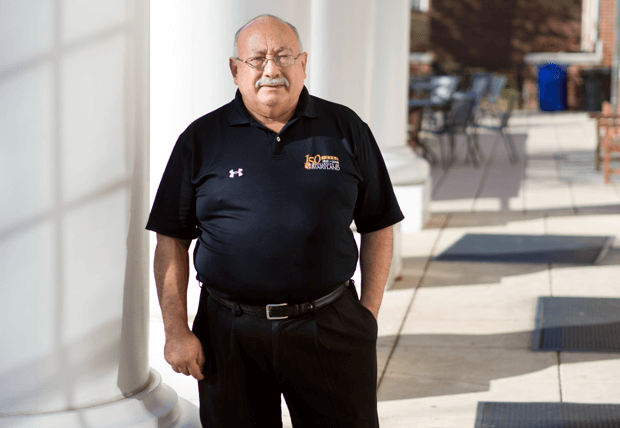
EDUARDO CASTILLO
Coffee Bar Barista, Dining Services
I love working with the young people. It’s very nice; they are very friendly—special people. In the summertime, when the students go home, I have time to visit my country. I am from Guatemala. I came to the United States on April 28, 1987. My brother was living here, and he helped me get a residence permit. My wife, my children and my 14 grandkids are here. My brother who used to live here now lives in Guatemala. I go every year for two or three months. I go to the forest, you know. I hunt, I ride horses—there are a lot of things to do there. It’s very nice in Guatemala.
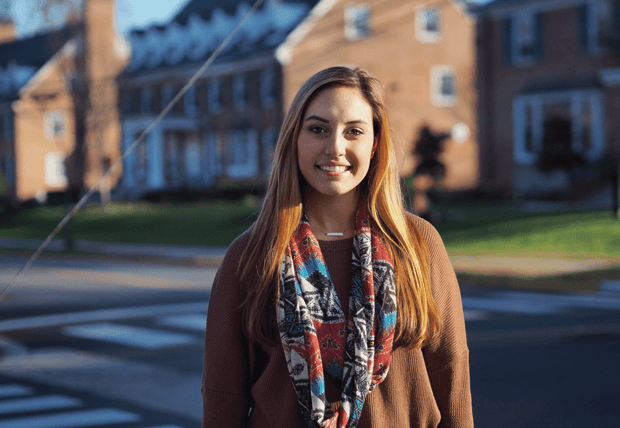
SADIE ISAKOWER ’18, mechanical engineering
Vice President of Risk Management, Panhellenic Council
I want to work with the military, possibly on the vehicle design side of things. A big thing for me when I joined Greek life was the realization, given the career track that I was on, that it might not be looked on entirely favorably, especially being a woman. I knew that if I had committed to doing this, I wanted to do everything in my power to change that social stigma of Greek life being all about the parties and unsafe drinking and not about giving back. I’ve seen some amazing examples of people going out in the community and doing good, but it gets kind of hidden under the scandals that break. My goal is to change that risky behavior here on campus, and make sure the horrible tragedies you hear about don’t happen.
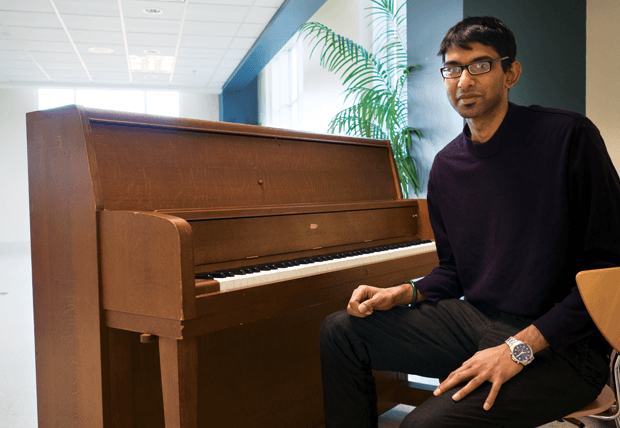
VARUN MANJUNATHA Ph.D. ’17, computer science
For me, piano playing and computer science are both creative activities. The reason I became a competent pianist is that I could play for a long time without losing focus. That is key to becoming good at anything, including computer science. If I hear a song on the radio and I want to play it, I never get it right the first time. What you do initially is form what you call a “line of attack”—it sounds OK but not great. But you fine-tune it and fine-tune it and fine-tune it—sometimes for a period of months, and then you’re done. And that’s exactly how computer science works. You want to solve a problem at the Ph.D. level no one has ever solved before. You have a line of attack, but it almost never works the first time, even if you’re a genius. But you backtrack a little, fine-tune it repeatedly, and then one day you have solved it.
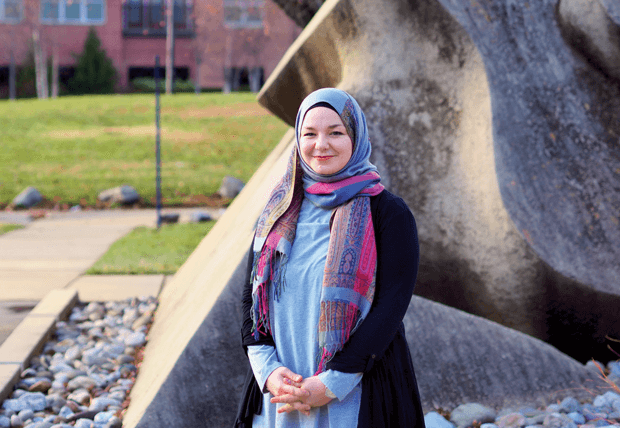
SALAM AREF ’17, architecture
I grew up in Kuwait, and I went back to Syria to study architecture. I left in April 2011. There was a lot of instability and insecurity, and I lived by myself. There’s a lot of history there. To see it going away really breaks my heart, but the worst part is seeing people dying. I stopped looking at videos a long time ago. Instead of dwelling on the past, I am trying to help. (One project) is basically putting to work refugees with a background in cooking and making a catering website.
For me, when I come (to school), I forget about everything. When you’re passionate about something, when you get to solve a problem or design something that might actually work—that’s why I’m here.
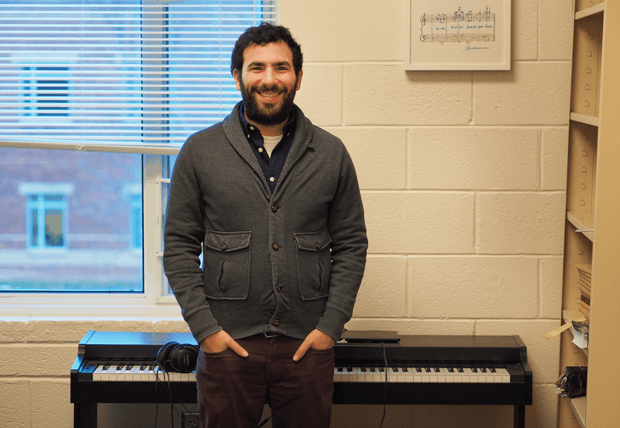
WILLIAM ROBIN
Assistant Professor, School of Music
Classical music is a living tradition. It’s still this thing you can experience in your lives. Especially the non-music majors, I want them to think, “This is something I can go see.” That history is vibrant and political and controversial and speaks to the present.
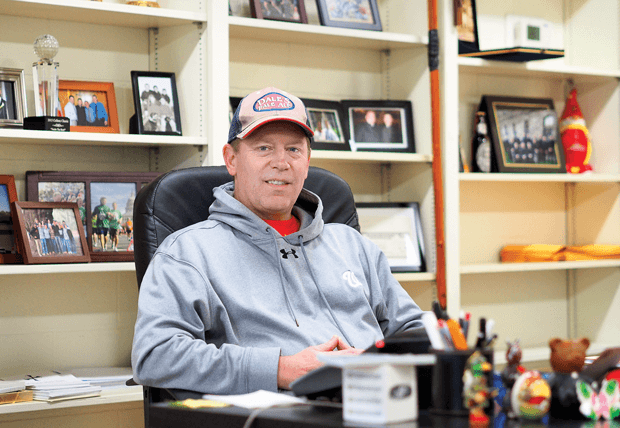
THE REV. ROB WALSH
Catholic Chaplain
I’m always talking to the kids about balance. I often talk to kids that are putting in so many schoolwork hours and they say, “It’s OK because I’m praying.” I’m like, “Great. What are you doing for sleep? What are you doing for exercise? What are you doing to chill with your friends?” We’re not about agendas. We’re not about corporations. We’re all about the individual.
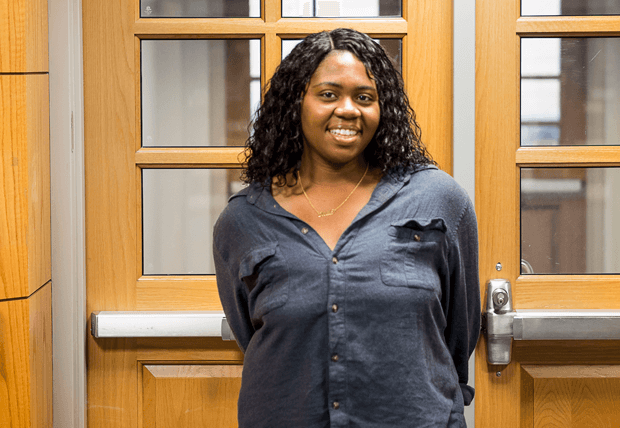
STELLA IWEH ’17, public health science
Resident Advisor, South Campus Commons
I like to cater my floor to the dynamic of my residents. I also like to respect them because most of them are older. I don’t have to hold anyone’s hand. I don’t have to knock on their doors every day. I always smile when I see them, I like to talk to them, and just make them aware of what we have.
Both of my parents are immigrants, and just coming to America, they both struggled feeling comfortable in a new environment. So I guess that was something I kind of wanted to do. Being safe in your environment, being comfortable in your environment, makes a world of difference.
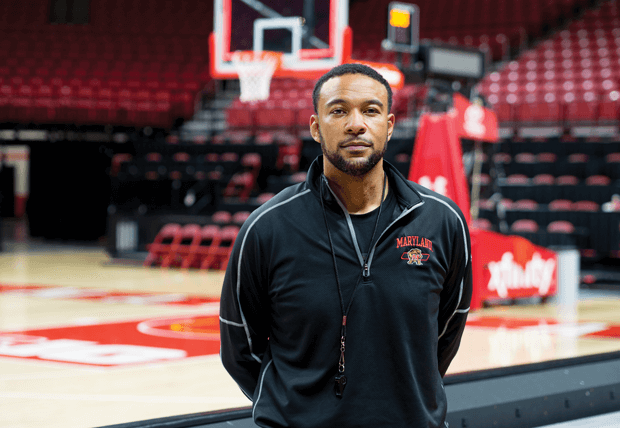
SHAY ROBINSON
Assistant Coach, Women’s Basketball
It’s about them, not me, but at the same time being the best me so I can be better for them. That discipline, to win and seize every day, just preaching those messages about life. Pushing yourself and understanding that every day you wake up, it’s about finding how great you can be. And the only way you’re going to do it is to accept adversity and not be afraid of that hot seat and not be afraid to get uncomfortable.
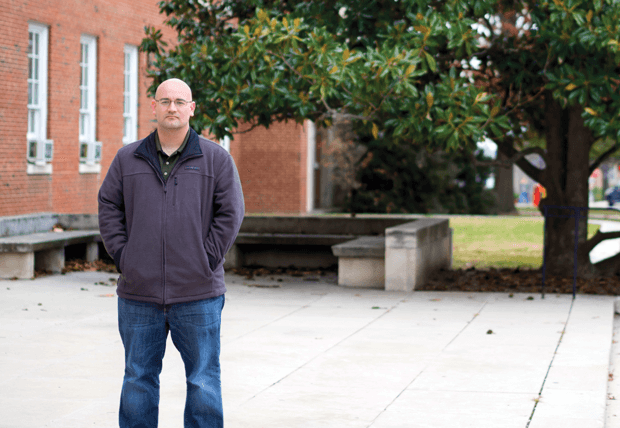
JASON MUSICK ’17, mechanical engineering
Peer Advisor for Veteran Education (PAVE) mentor
When I got back from deployment I was all right, probably better off than a lot of guys I know. A good friend of mine killed himself in December of 2014. That really hit me hard. I went through a time of what my therapist would call survivor’s guilt. I was just like, how come I was able to come back and some guys I knew came back, but they didn’t really. And then I started to fall into that same realm.
I had a conversation with my father when I was going through a bad time. I’d been drinking heavily one night, and my dad asked me if I was okay and I was like, “No, I am not okay.” There’s nothing like having a conversation with your father, telling him that his son died in Iraq, and that the person that he was looking at is not his son. What I’m going through is not just a one-and-done thing. It’s been years. I’ve gotten better at coping and identifying situations that will take me down a path of suicidal thoughts, but it’s something I battle with to this day.
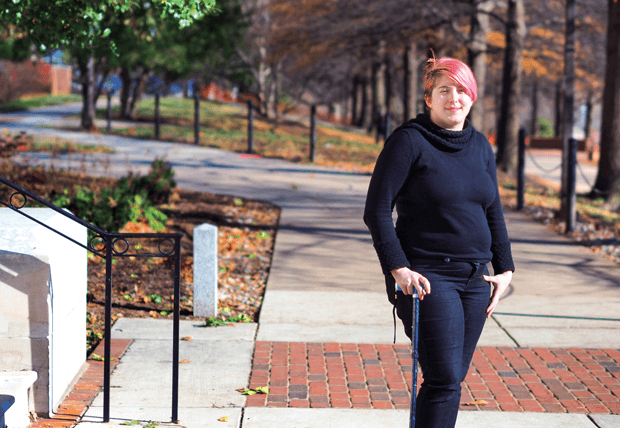
TERESSA FERRARO ’17, Spanish and Russian
When Moira Rogers [executive director of Education Abroad] asked the Spanish department if there were any students that might be good for the Disabilities in a Global Context program, my name came up. I had actually just written an essay about how I couldn’t study abroad because I was too sick. I was like, “I don’t think I can do this,” but Moira really pushed and I ended up saying, “Okay, we can give this a try.”
I didn’t believe it was happening until I was literally in Ecuador. It was a way to push my boundaries in a safe location. The experience not only of going there but of being empowered to go there made a huge difference in terms of where I am now and my decision to apply to grad school. It was the first time someone said, “Your academic record doesn’t define you as a person. I think you can go on and do great things.”
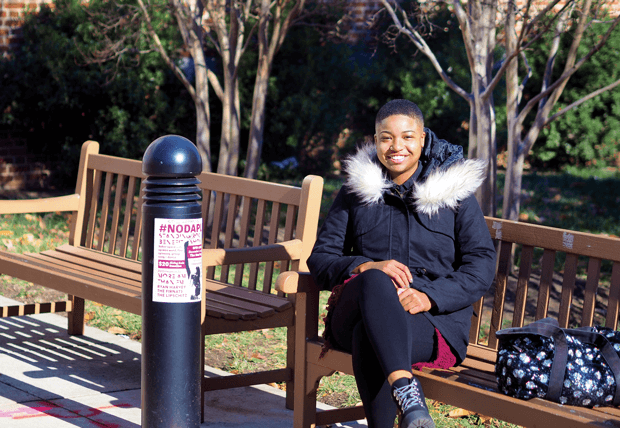
TIVANA STEPNEY ’17, sociology
I first realized I was a lesbian when I was 14. It was a really confusing time because I didn’t know what to call it. I didn’t know that it was called “coming out,” I didn’t know that it was called “lesbian,” I didn’t know that it was called “queer”—I just knew that I liked girls. I told my mom, which was really difficult because our family is very religious. My mom wasn’t accepting at first. That was really hard—being 14 and not having a relationship with your mom or being able to say who you’re dating or talk about relationships, or even just talk about sex in general. Fourteen is when you’re curious, and I didn’t have that talk with my mom.
This Thanksgiving, she said to me at the dinner table that she accepts me. “I apologize” were the first words she said to me. She said, “I support you and I support everything about you, and I defend you,” and I realized that she really truly meant it. I’m still battling with it in my head. I want to say that I’m proud and I want to say that I’m happy that she accepts me, but there’s also part of me that’s kind of holding a grudge that I lost seven years of a relationship with a mother.
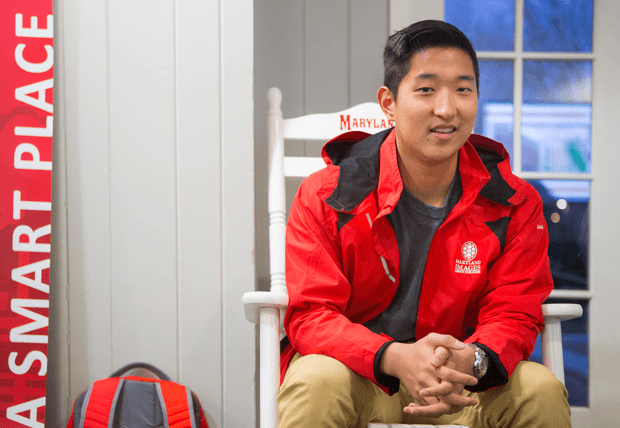
ANDREW SCHNELL ’19, biology and psychology
Maryland Imagers tour guide
I had bad tour guides when I was looking at colleges. I knew how scared I was, how anxious I was. Being a tour guide, I get to help those kids who were in my shoes and say, “I want to give you that good tour.”
I’ve done about 26 tours this semester. I want to get 100 before I graduate. It’s almost a stress relief for me. Studying to me feels almost selfish. I know it’s not in the end, because I want to be a doctor and then I get to help people. But studying is taking time all to myself, and being a tour guide is a way to take my time to help other people.
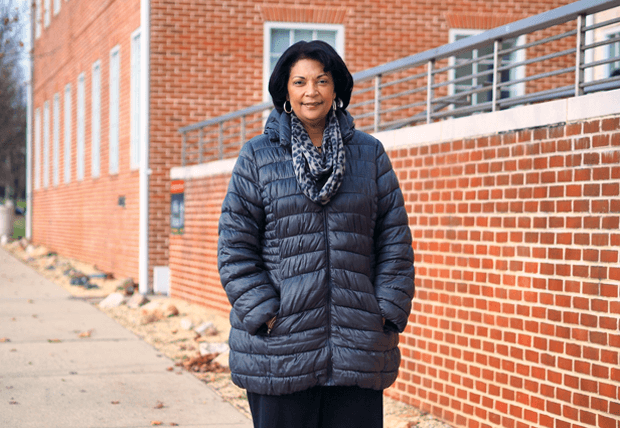
CHERYL HARRISON
Director of Gift Planning
Incentive Awards Program mentor
I started volunteering as a mentor three years ago. I went to the reception to meet my student, and discovered she went to my high school, and we had an instant connection. I think I’ve been a sounding board as she has come through her collegiate experience, and just seeing the way she has matured and the confidence that she has built over four years, it’s wonderful.
We talk about boyfriends, sometimes she’s stressed about exams, or she’s asking about applying to graduate schools. We had a stirring conversation about an internship that she didn’t want to do. I had to tell her to get over yourself and this is something you need to do. Working at Chipotle for the summer—you’ve got to do that for the money, but you also need to do this internship for your career. And it was so funny, I could see her head working. She called me the next day and said she was going to apply for the internship.
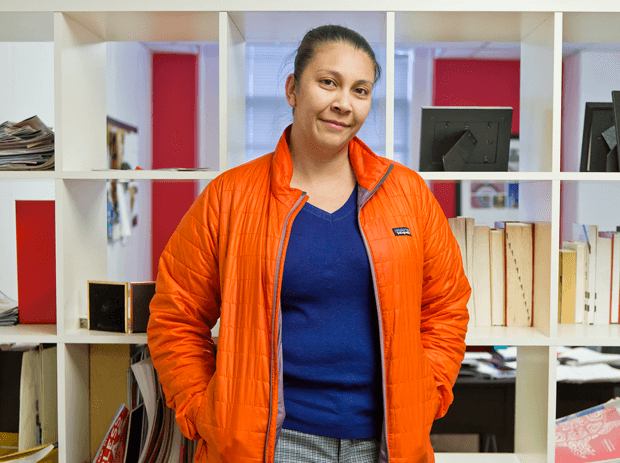
REBECCA STONE M.S. ’18, human-computer interaction
Statistically, I’m not supposed to be here. I’m from Indian country, I’m a female, and I’m in STEM. Native Americans have more (high school) dropouts than any other ethnicity. I beat that round of statistical destiny by graduating from high school and college. Then I joined the service and worked on all kinds of crazy technology and systems, and the whole time I was, like: Who designed and built this stuff? Because they obviously didn’t think about the end user when this was being put together. I talked with a lot of different people from different disciplines—mentors, sponsors, everyday end users, scientists, directors—and I thought, this is what I want to do. So I’m a first-generation student, a first-generation anything in my family—if I’m going to do it, I’m going to go all the way. I’m going to go to graduate school.
Portraits by TERP Staff
Tags
Student Experience